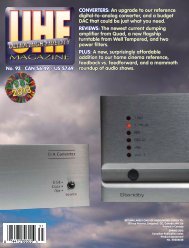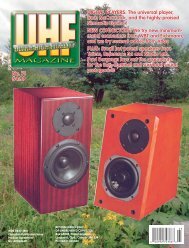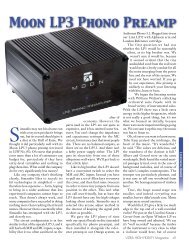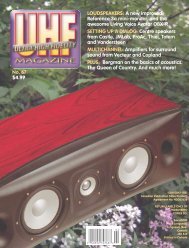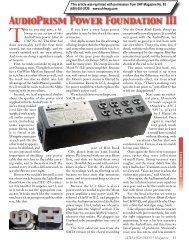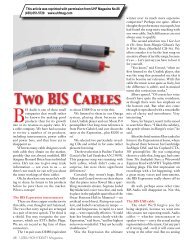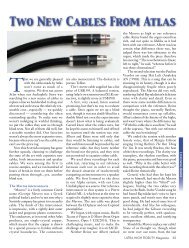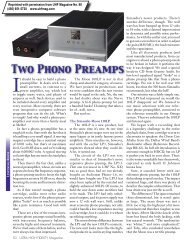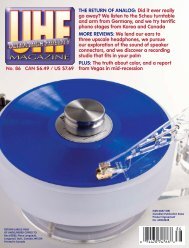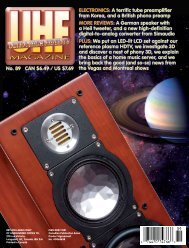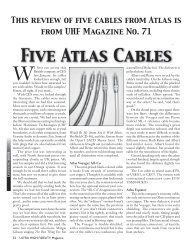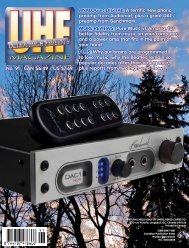USB DONE RIGHT: Two magic boxes that let computer audio ...
USB DONE RIGHT: Two magic boxes that let computer audio ...
USB DONE RIGHT: Two magic boxes that let computer audio ...
You also want an ePaper? Increase the reach of your titles
YUMPU automatically turns print PDFs into web optimized ePapers that Google loves.
Software<br />
Feedback<br />
laid out as inter-related developments of (who called him “Papa”) and tutor to<br />
one or more themes. These themes were Beethoven. Most of Haydn’s music is<br />
expressed in a single melodic line sup- upbeat in feeling — the counts didn’t<br />
ported by harmony, <strong>that</strong> is, chords. At the want the music they paid for to depress<br />
same time, music became more widely them — and indeed threaded through<br />
accessible. Where only churches and and through with wit and humour. His<br />
palaces had been performance venues, Surprise Symphony No. 94, still popular<br />
now much of the nobility and even the today, includes a single fortissimo chord<br />
simply rich became patrons of art music. at the end of the piano opening theme of<br />
We already have NOT Mozart JUST and the HARDWARE second movement, but no REVIEWS!<br />
other such<br />
Beethoven on the Classical-era team. chords before or after.<br />
Mozart died young and Beethoven was Yes, You we get might asked, not constantly, listen to Haydn after<br />
already at the turning point of the what next we breaking will be reviewing up with in someone our next (and issue. then<br />
era, the Romantic. To find a ClassicalAnd<br />
again, we know perhaps reviews you are might). essential. Although he<br />
style composer who enjoyed a But long equipment and did clearly reviews write are nothing some pieces if not to plentiful. express<br />
prolific career and can truly represent Readers an have deep long feeling, told us in <strong>that</strong> general what his makes music UHFis<br />
entire era, we can very reasonably particularly turn more valuable structured, to them are bright the other and worldly, articles.<br />
to Joseph Haydn. Articles about ideas, the about melody the and nuts harmonies and bolts meticulously of the technology,<br />
and worked also about out, rather music than and evoking film, strong<br />
emotion. which are (For the <strong>that</strong> very kind reasons of thing we’ll<br />
for our have lovingly-created to wait for systems Beethoven.) to exist. What<br />
Born into a musical but not a noble<br />
family, he was apprenticed as a musician<br />
when he was six years old and struggled<br />
from rags to riches, finally employed for<br />
the greater part of his working life by<br />
the Esterhazy counts of Hungary. He<br />
was able to produce 106 symphonies, 70<br />
quartets, 45 trios, 62 piano sonatas and<br />
upwards of 70 other solo piano works,<br />
about 36 concertos, four oratorios, fifteen<br />
masses and fifteen operas between<br />
about 1750 and 1802.<br />
While with the Esterhazys, composing<br />
and managing an orchestra, he<br />
was relatively isolated and dreamed of<br />
Vienna, the seat of the music-loving<br />
Hapsburg emperors and centre of the<br />
musical world. Vienna is where he<br />
ended his life, universally admired,<br />
beloved friend of the late genius Mozart<br />
64 ULTRA HIGH FIDELITY Magazine<br />
notable Classical names include Johann<br />
Sebastian’s eldest son, the surprising and<br />
original Carl Philip Emmanuel Bach,<br />
even though the earlier Baroque period<br />
claims him too. There is Luigi Boccherini;<br />
and Johann and his son Carl Stamitz<br />
who invented the multi-movement<br />
symphony. Among others we could add<br />
Gluck, who had great influence on opera,<br />
Salieri (made infamous — or some would<br />
say slandered — by Peter Shaffer’s Amadeus)<br />
and Antonio Soler for the keyboard.<br />
And now we move to Bach, or rather<br />
to his time.<br />
That wasn’t really so long before<br />
the opening of the Classical era.<br />
Johann Sebastian Bach was still writing<br />
when Haydn was a teenager, though<br />
even then he was regarded by many as<br />
old-fashioned, a provincial pastor. Albert<br />
Schweitzer, the great humanitarian<br />
Not <strong>that</strong> we will Haydn ever stop did for publishing music was hardware experiment reviews.<br />
doctor and Bach scholar, called Bach “an<br />
with form, discovering new possibili- end,” a finality to whose work we always<br />
ties in the quartet, the sonata and the return. Douglas Adams, author of The<br />
symphony — like <strong>that</strong> surprise chord, Hitchhiker’s Guide to the Galaxy, said of<br />
which everyone agreed was delightful. the Big Three, “Beethoven tells you what<br />
Just as significantly for our musical it’s like to be Beethoven and Mozart tells<br />
heritage, at the end of his life he pro- you what it’s like to be human. Bach tells<br />
duced two great oratorios. One factor you what it’s like to be the universe.”<br />
in their greatness was the time Haydn<br />
took to write them: over a year for the<br />
first, The Creation. Earlier in his life,<br />
like almost all composers, he had had to<br />
turn out music rapidly for his employer<br />
(who for all his wealth, couldn’t hear<br />
new music at anything like the rate we<br />
can today). Haydn knew The Creation<br />
and The Four Seasons were to be his last<br />
works and he wanted them as close to<br />
sublime as he could make them. It was a<br />
revelation at the time.<br />
If the editor were to <strong>let</strong> me occupy a<br />
mere rind of the Software Reviews’ territory<br />
in this magazine, I would suggest<br />
a single recording as an introduction to<br />
the best in the composers’ repertoires.<br />
That’s a tall order, and my choice for<br />
Haydn is a cheat because it’s multiple<br />
discs: the Beaux Arts Trio’s Comp<strong>let</strong>e<br />
Haydn Trios on Philips.<br />
Revered today, too much of a stand-<br />
So now your Classical-period playlout to be a mere representative of the<br />
ist includes Haydn and Mozart. As if Baroque, Bach was largely forgotten<br />
their work needed great company, you in the years after his death. Beethoven<br />
will still be able to send Beethoven and attracted attention in his youth by per-<br />
Schubert to join them (even though these formances of fugues by Bach in Vienna,<br />
two are both sometimes placed with the and Mozart had to be led to him, perhaps<br />
coming Romantic wave). Other very by the Viennese music patron Gottfried



